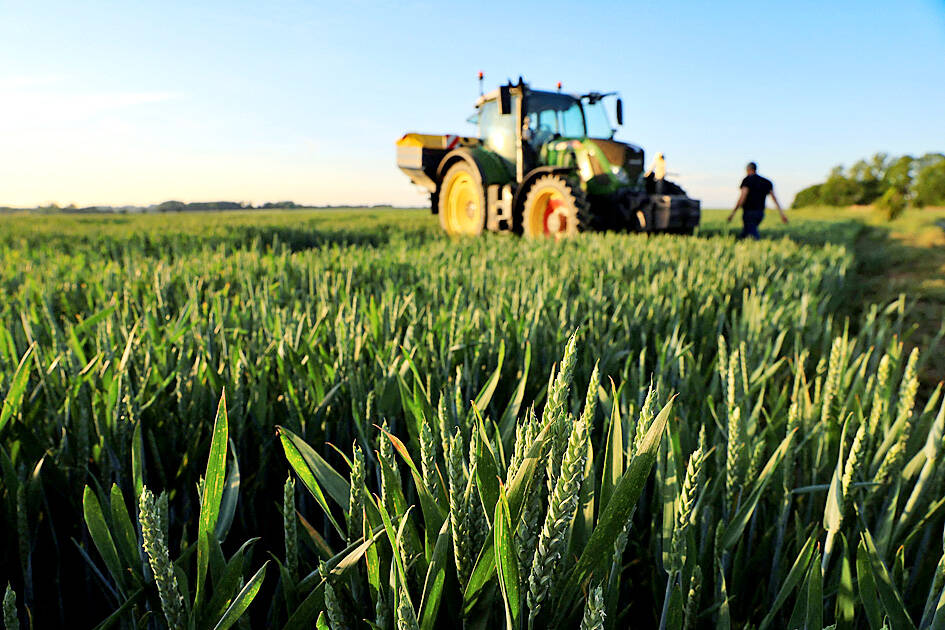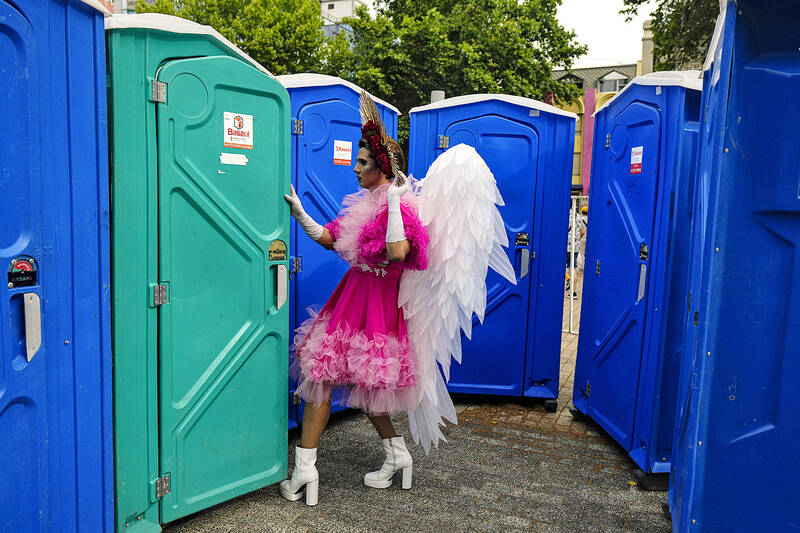For all its crap, the US is not doing much with it.
Wasted, a start-up based in Burlington, Vermont, is hoping to change that. The three-year-old company collects human waste from portable toilets and transports it to a processing center, where the excrement is treated through a nutrient recovery process to create fertilizer.
On Wednesday, Wasted announced US$7.5 million in seed-stage funding from investors that include Collaborative Fund, Divergent Capital, Day One Ventures, Third Sphere, Pure Ventures and Gratitude Railroad.

Photo: Reuters
The funding is to go to Wasted’s first pilot program, involving 200 porta potties on construction sites in Burlington. Solid waste from the retrofitted toilets would be transported to a nearby facility in Williston to be processed into a nitrogen-rich fertilizer aimed at reducing the phosphorus run-off that creates algae bloom on Lake Champlain.
“What we’re building through the porta potty industry is distributed, climate-resilient sanitation that can be deployed everywhere that it’s needed,” Wasted cofounder and CEO Brophy Tyree said.
Wasted’s porta potties — which at US$200 cost about as much as the traditional version, according to Tyree — are part of what is known as “container-based sanitation.” It is a catch-all term for toilet systems that collect human waste in containers, then transport the excreta for processing at treatment facilities.

Photo: AP
As a cost-effective solution in densely populated cities and countries with limited sewage infrastructure, turning waste into fertilizer is attracting the attention of start-ups in Europe, including Sweden’s Sanitation 360 and France’s Toopi Organics. Tyree’s goal is to bring the idea to the US.
“We chose to do it here because it’s not currently being done here,” Tyree said. “We saw the opportunity to stand on the shoulders of giants who really pioneered it in other countries.”
For locales with sewage systems in place, the draw of container-based sanitation is environmental. Such systems generally use less water, and converting human waste into fertilizer is particularly useful amid inflated fertilizer prices after Russia’s invasion of Ukraine.
Another selling point is having a bathroom environment that smells better, Tyree said.
Cofounded in 2020 by Tyree, Taylor Zehren and Thor Retzlaff, Wasted grew out of a nonprofit called Do Good Shit, which the founding team launched in 2018 after noticing exorbitant amounts of human waste during mountaineering trips. Do Good Shit provides toilets and other sanitation facilities near popular outdoor destinations.
Wasted is starting with an equally narrow focus, but has big plans. The start-up is eyeing other venues with portable toilets — including camping sites, concerts and outdoor events — and looking to expand into a second city next year.
Wasted plans to tailor its fertilizer to local needs and has also filed a patent for a toilet that can parse liquids from solids, Tyree said.
First, though, Wasted must overcome the “ick factor.”
While the company has many international examples to look to, Cornell University biologist Rebecca Nelson said it might struggle to introduce container-based sanitation to US consumers.
In that respect, the dearth of US competition could help. Cities such as Chicago and Tacoma, Washington, already have programs that produce fertilizer from sewage waste, but Wasted has few direct competitors in the container-based sanitation space.
“That’s why it’s an opportunity. There’s a lot of value on the table,” Nelson said. “It’s straight up nutrient value.”

POWERING UP: PSUs for AI servers made up about 50% of Delta’s total server PSU revenue during the first three quarters of last year, the company said Power supply and electronic components maker Delta Electronics Inc (台達電) reported record-high revenue of NT$161.61 billion (US$5.11 billion) for last quarter and said it remains positive about this quarter. Last quarter’s figure was up 7.6 percent from the previous quarter and 41.51 percent higher than a year earlier, and largely in line with Yuanta Securities Investment Consulting Co’s (元大投顧) forecast of NT$160 billion. Delta’s annual revenue last year rose 31.76 percent year-on-year to NT$554.89 billion, also a record high for the company. Its strong performance reflected continued demand for high-performance power solutions and advanced liquid-cooling products used in artificial intelligence (AI) data centers,

SIZE MATTERS: TSMC started phasing out 8-inch wafer production last year, while Samsung is more aggressively retiring 8-inch capacity, TrendForce said Chipmakers are expected to raise prices of 8-inch wafers by up to 20 percent this year on concern over supply constraints as major contract chipmakers Taiwan Semiconductor Manufacturing Co (TSMC, 台積電) and Samsung Electronics Co gradually retire less advanced wafer capacity, TrendForce Corp (集邦科技) said yesterday. It is the first significant across-the-board price hike since a global semiconductor correction in 2023, the Taipei-based market researcher said in a report. Global 8-inch wafer capacity slid 0.3 percent year-on-year last year, although 8-inch wafer prices still hovered at relatively stable levels throughout the year, TrendForce said. The downward trend is expected to continue this year,

A proposed billionaires’ tax in California has ignited a political uproar in Silicon Valley, with tech titans threatening to leave the state while California Governor Gavin Newsom of the Democratic Party maneuvers to defeat a levy that he fears would lead to an exodus of wealth. A technology mecca, California has more billionaires than any other US state — a few hundred, by some estimates. About half its personal income tax revenue, a financial backbone in the nearly US$350 billion budget, comes from the top 1 percent of earners. A large healthcare union is attempting to place a proposal before

Vincent Wei led fellow Singaporean farmers around an empty Malaysian plot, laying out plans for a greenhouse and rows of leafy vegetables. What he pitched was not just space for crops, but a lifeline for growers struggling to make ends meet in a city-state with high prices and little vacant land. The future agriculture hub is part of a joint special economic zone launched last year by the two neighbors, expected to cost US$123 million and produce 10,000 tonnes of fresh produce annually. It is attracting Singaporean farmers with promises of cheaper land, labor and energy just over the border.